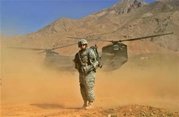
WASHINGTON (Reuters) – The U.S. military conceded it was not winning the fight against an increasingly deadly insurgency in Afghanistan and said on Wednesday it would revise its strategy to combat militant safe havens in Pakistan.
Defense Secretary Robert Gates and Adm. Mike Mullen, chairman of the Joint Chiefs of Staff, told the House of Representatives Armed Services Committee success in Afghanistan would require more civilian effort beyond the military fight.
“Frankly, we’re running out of time,” Mullen said.
“I’m not convinced we are winning it in Afghanistan. I am convinced we can,” he said, offering a sober assessment nearly seven years since U.S.-led forces toppled the Taliban after the September 11, 2001, attacks.
Violence in Afghanistan has soared over two years as al Qaeda and Taliban fighters have regrouped in the remote region between Afghanistan and Pakistan.
While the Bush administration has said it would send more troops, some critics say the plan is inadequate and any strategy must also focus on Pakistan’s side of the border, where U.S. officials say Osama bin Laden is likely hiding.
Mullen said he was “looking at a new, more comprehensive strategy for the region” that would cover both sides of the border, including Pakistan’s tribal areas.
“These two nations are inextricably linked in a common insurgency that crosses the border between them,” Mullen said.
“We can hunt down and kill extremists as they cross over the border from Pakistan … but until we work more closely with the Pakistani government to eliminate the safe havens from which they operate, the enemy will only keep coming.”
The United States has stepped up attacks against militant targets inside Pakistan this year with a series of missile strikes from unmanned drones and a raid by helicopter-borne U.S. commandos in recent days.
The attacks have sparked an outcry from Pakistani leaders and may have complicated the challenges facing newly elected Pakistani President Asif Ali Zardari.
U.S. commanders in Afghanistan have requested three more combat brigades, or about 10,000 more soldiers, to help cope with insurgent activity. Some 33,000 U.S. troops are already there including 14,000 who are part of a 53,000-strong NATO military command.
“CAN’T KILL WAY TO VICTORY”
The officials said the West should do more to help Afghans with new investments in roads and other infrastructure, education and crop assistance.
“These are the keys to success in Afghanistan,” said Mullen. “We cannot kill our way to victory.”
He said Afghanistan badly needed a national security force supported by local leaders. Gates supports an Afghan government proposal to double the size of the country’s army by creating an active-duty force of 122,000 troops by 2014.
However U.S. reinforcements depend on Washington’s ability to reduce forces now deployed in Iraq, where the Bush administration has waged an unpopular war that critics say distracted attention from Afghanistan and al Qaeda.
President George W. Bush said this week he would send only one Army brigade and a Marine battalion by next February.
(Additional reporting by Andrew Gray; editing by Alan Elsner and Kristin Roberts)
By David Morgan
Sept. 10, 2008
Source: Reuters